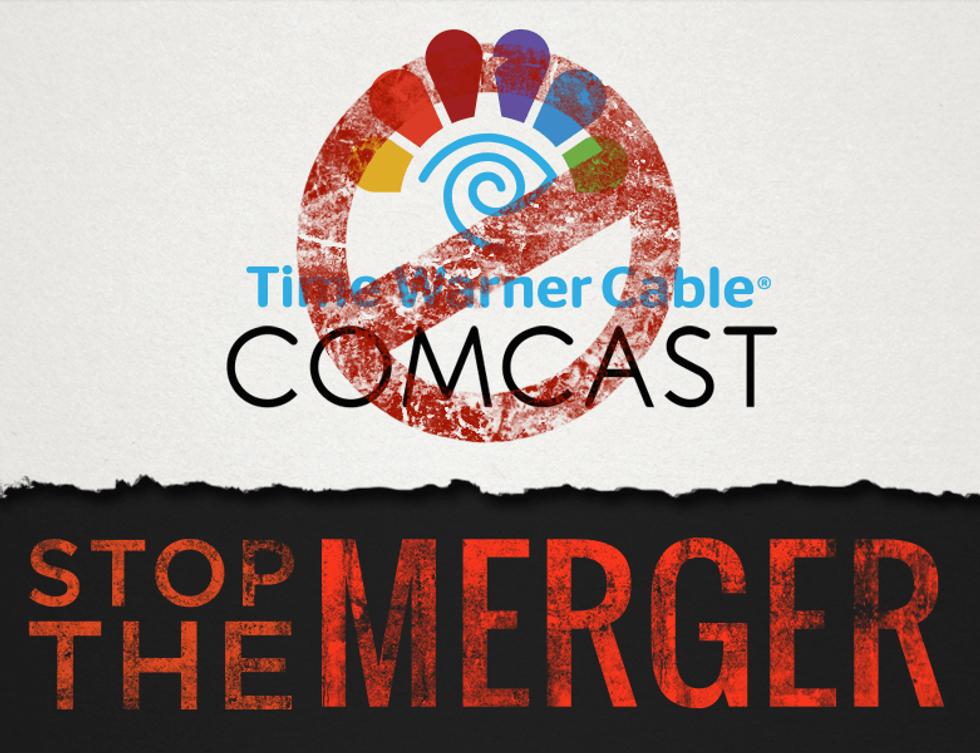Much business news is pretty opaque to many citizens. Terms like leveraged buyouts, puts, and calla seem to be the stuff of expert financiers or con artists. Nonetheless, the media have recently reported a story that hits home for many. Number one Cable and broadcast conglomerate
Comcast proposes to purchase number two Time Warner. The economic case against this transaction is overwhelming. But so too is the political case. And not surprisingly, the major media conglomerates, which profit from this whole continuing process of consolidation, have done an exceptionally poor job covering the story.
Comcast maintains that this merger will better serve its customers by expanding the range of choice. The major corporate media have long argued that the shape of the modern media is simply a result of consumer preference. It is in other words another manifestation of the free market. A brief perusal even of Comcast's current components should disabuse us of that notion. Comcast now owns NBC and its subsidiary networks. NBC benefited from original government grants of a place on what was then a very limited broadcast spectrum. Granted privileged access to a mass audience in major cities, the big media players had what my late senior colleague at The Progressive called a license to print money. These initial benefits at least were limited in some ways. The fairness doctrine required licensees to present alternative views and the networks were limited to the number of stations they could directly own. Over the years, however, the deregulatory climate that has infected other areas of the economy became especially pronounced in the media. The fairness doctrine was repealed and rules about cross ownership of media properties loosened. These changes are often portrayed as a return to market principles, but the helping hand of government has always been ready to indulge the ambitions of the biggest players. Perhaps one of the most telling incidents was the push for high definition television. No less a figure than 1996 Republican presidential candidate Bob Dole objected: "the F.C.C. is going to give away the first broadcast licenses for digital television to broadcasters for absolutely nothing. If the Government sold this new spectrum, it could be worth $12 billion to $70 billion. The network news programs are proud of their commendable watchdog segments like ''The Fleecing of America,'' ''Reality Check'' and ''Your Money.'' But the networks and many newspapers that own TV stations have largely ignored their own fleecing of the taxpayers."
In a recent column on this planned merger, Paul Krugman correctly points out that such concentrated economic power is a barrier to innovation and may have slowed economic growth. I would add that concentrated economic power has gone hand in hand with political power and has shaped much of our political dialogue.
Just as the media did a poor job covering the ripoff that so incensed Senator Dole, it has done an inadequate job of highlighting important issues in the Concast TWC takeover. Veteran CNBC business reporter David Faber presented the company's arguments on behalf of the merger and then briefly mentioned that some consumer groups objected. He concluded the story by saying that the FCC regulators would determine the validity of their complaint. But what is missing in this story is the contention by many consumer groups that these regulators are no longer disinterested judges and have become part of the pro-monopoly complex. That contention may be controversial, but it surely deserves a hearing. Yet this is just the kind of story the concentrated media is unlikely to cover.
This story also suggests just why the deregulatory push is unlikely ever to go so far as to abolish such agencies as the FCC. Corporate behemoths want to be able to cite the blessings of "neutral" regulators when they are charged with malfeasance. Far better to retain defanged regulators than have no regulators ready and willing to extend their blessings.
Media monopoly depends heavily on the advertizing dollars of other corporate conglomerates and in turn helps sustain them both politically and economically. Even before this move to further consolidate the broadcast media, content has been demonstrably narrow.
When GE owned NBC, were stories about the risks of nuclear power prominent? And today, with the nightly newscast a virtual cornucopia of drug ads, can we expect to see stories about the excesses of the major pharma companies? And individual drug scandal may briefly make the news, but systematic looks at the problem are non-existent. An in-depth story might expose the role of monopoly itself, through the patent system, in fostering incentives for the distortion and manipulation of clinical trials and promotion of unjustified use of the drugs.
The broadcast media, their corporate sponsors, and the government have an incestuous, deeply corrupting relationship. It is not surprising that a media that has come to depend so much on the financial and regulatory graces of government would be so compliant with national security state demands that it repress genuinely investigative journalism.
Even in an age of social media like Facebook and Twitter most Americans still get a substantial portion of their news from television. These struggles still matter. Comcast has thrown down the gauntlet to consumer and media reform organizations. This proposed buyout is a textbook case of anti-competitive behavior. It will both raise prices and further restrict the range of content provided to citizens. If it is approved it will constitute clear proof that the regulators are compromised. Yet the level of public awareness is also high. There may be more interest in pressing not only to overturn such decisions but also to foster a more genuinely competitive, diverse, and open media.




